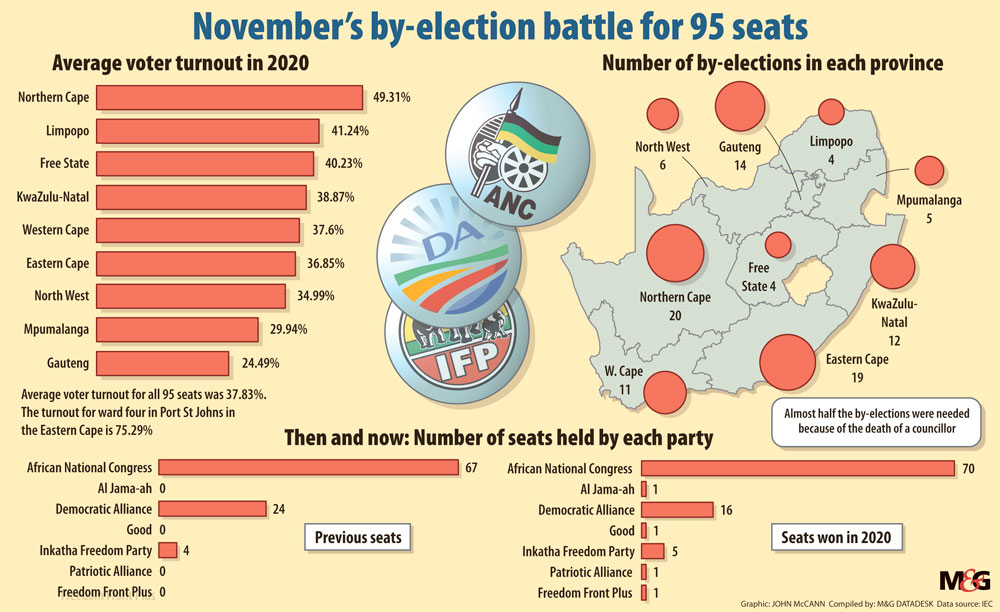The Electoral Commission has asked the high court to postpone nine by-elections. (Delwyn Verasamy/M&G)
Extraordinary. That is what the Independent Electoral Commission has called the largest number in South African history of by-elections held on a single day.
As always, there are winners and losers when more than 187 000 South Africans walk into a crèche, school or community hall to cast their votes. With 96 wards up for grabs, the ANC finished the day as the biggest winner.
The DA started Wednesday looking to retain 24 wards. By the end of the day it had lost nine, retained 14 and won just two new ones.
It lost to the ANC in the Northern Cape. In the North West it lost a ward in Potchefstroom to the Freedom Front Plus. In Gauteng it lost a ward to Al Jama-ah. Elsewhere it lost out to the Good Party and the Patriotic Alliance.
The difference wasn’t the average voter turnout, which stood at 37% compared to an average of 38% over the past four years. The highest turnout recorded was 75% in ward four in the Eastern Cape’s Port St Johns municipality. The ANC took this ward.
The lowest voter numbers were in the Eastern Cape’s Umzimvubu and Amahlathi districts, where fewer than 600 people pitched. In Umzimvubu only 10% of registered voters cast their votes.
The majority of areas with less than 25% voter turnout were not strongly contested and were in urban areas. In places with low voter turnout, political parties retained their wards, particularly in metropolitan areas such as the cities of Cape Town, eThekwini and Johannesburg.
 (John McCann/M&G)
(John McCann/M&G)
The power of the older vote
Political analyst and Unisa lecturer Professor Lesiba Teffo said low voter turnout was attributable to young people not voting, adding the elderly were more likely to vote in rural areas because they might fear the loss of their state pension grants.
Teffo referred to the case of a 94-year-old woman, who was shown on broadcast news networks this week queuing from 6am to cast her ballot, which he called shameful.
“Who had an interest in abusing such an elderly woman? Because she could not have said, ‘I’m going to vote; please take me there.’ The question of pension grants and playing on elderly [people]’s emotions may have led old people to say, ‘Please don’t forget me; I want to vote, or they will take away my grant.’” Teffo’s comment speaks to a view that the ANC gets votes from people who believe that voting for other parties will mean they lose their state benefits.
The ANC showed its strength after the difficult local elections during the presidency of Jacob Zuma, taking 69 of the 96 wards that were up for grabs. It went into the elections with 59 wards, which it wanted to retain, and added 10 more.
In Gauteng, the party said the results show residents have reaffirmed their confidence and trust in the ANC. It won 12 of the 14 wards up for grabs in the province, retaining 10 and gaining two more.
Teffo said increased racialisation of voting patterns and a “politically illiterate” electorate, which shrugs off the ANC’s string of corruption scandals, has defined this week’s countrywide by-elections.
“When you burn 50 schools in two or three months because you are unhappy with service delivery, but the following day you give the same party more than 70% in votes, that is sorry.”
“That is the analysis that we should be interested in: What gets the people to go and vote for the same party in the face of all of this?”
DA shift to the white
Dr Sithembile Mbete, a politics expert from the University of Pretoria, said the by-elections were a litmus test for next year’s polls.
The trend of the DA losing would likely continue then, she said.
“The DA has chosen, after expanding so much in minority communities (predominantly coloured and Indian areas between 2011 and 2016) to drive a rhetoric over the past year centred around those votes not being important anymore. The DA wanted to get white voters again and was concerned about losing them to the Freedom Front Plus.
“We can definitely read a lot from the DA losing votes in Gauteng and in predominantly coloured and Indian areas; in the Western Cape’s Garden Route and parts of the province’s rural areas,” Mbete said.
This trend started last year and the party blamed Mmusi Maimane, she said, “for supposedly turning the DA into an ‘ANC-light’”.
Mbete said the continuation of the trend, after the removal of Maimane, shows that “we are likely to see more of that in next year’s elections unless the DA does something drastic in changing the party’s direction. But I don’t see that happening.”
Dr Mcebisi Ndletyana, a political analyst from the University of Johannesburg, echoed this sentiment, saying the DA had reversed its gains in black communities. Maimane’s primary mandate was to grow the DA in black areas after the party had plateaued prior to his leadership.
“Mmusi began to steer the DA towards socioeconomic justice issues. In steering more to the centre, the DA had to minimise rhetoric that defended [white] minorities. Mmusi was vocal against racism, while Helen was talking about how colonialism was not so bad.”
Ndletyana said by steering away from coloured and Indian voters, and with the departure from the party of leaders in those communities, a space had been created for “more racially and ethnic-specific language, which benefited the Patriotic Alliance and Al Jama-ah”.